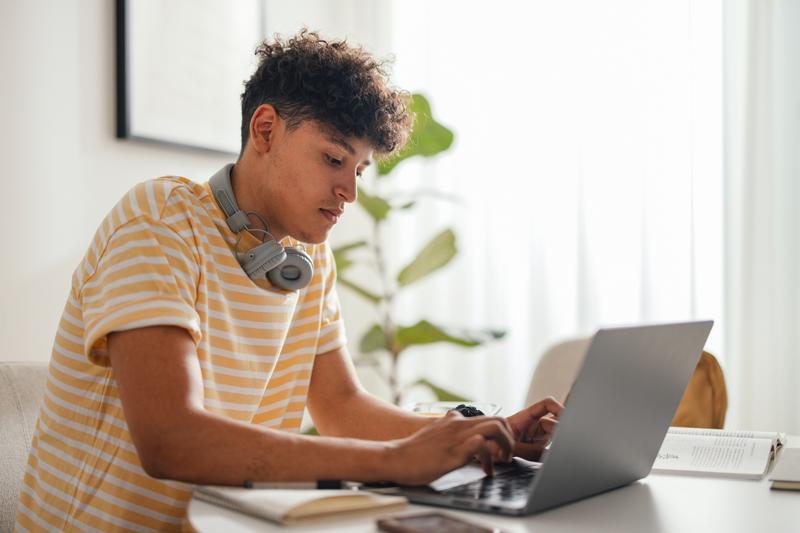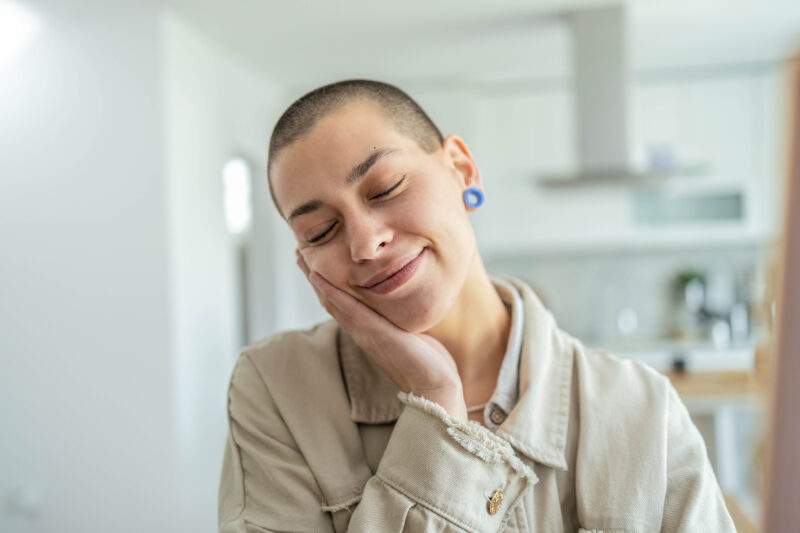Virtual Intensive Outpatient Programs (IOPs) at Charlie Health
 Real healing starts with connection.
Real healing starts with connection.
Treatment designed for your needs and schedule
When someone is facing serious mental health challenges, or a substance use disorder, it can be difficult to know what kind of care will actually make a difference. Traditional therapy may not be enough. Inpatient treatment may feel like too much.
Virtual IOP fills this crucial gap in the care spectrum.
Charlie Health’s virtual Intensive Outpatient Programs (IOPs) offer structured, personalized approaches for kids, teens, and adults who need more support than weekly therapy can provide. Our model combines evidence-based treatment with consistent peer connection, helping people make meaningful progress while staying engaged in daily life.
For anyone seeking care that’s more structured, more personalized, and designed to fit real life, this is the right place.
What is IOP?
Intensive outpatient programming (IOP) is a level of behavioral healthcare designed for people who require more support than traditional outpatient services offer, but less than residential or inpatient treatment. At Charlie Health, it consists of 9-12 hours of care per week for 9-12 weeks.
Those hours include group sessions, individual therapy, family therapy, and psychiatry when clinically appropriate. The goal is to help people manage their behavioral health needs and build lasting stability while still keeping their daily routines.
Group sessions
By bringing together people with similar behavioral health challenges, identities, and backgrounds, we create groups where clients can learn new skills, feel safe sharing openly, and build the kind of connections that support long-term healing.
Individual therapy
One-on-one connections are critical to the IOP model, which is why each client’s treatment plan includes a primary therapist for weekly sessions focused on processing emotions, building coping skills, and making sense of patterns that appear in daily life.
Family therapy
A leading predictor of success in our programming is family involvement. At Charlie Health, family therapy teaches communication and coping skills to create a more supportive home environment both during and after treatment.
One model. Two distinct programs.
Our IOP programs are designed to meet you where you are. We offer age-appropriate care for kids, teens, and adults. The support you receive reflects who you are, what you’re going through, and what will help you heal. Your care is tailored to your life and your goals. In all programs, clients also receive support through our 360° care ecosystem — including family and community groups, crisis resources, care navigation, and Alumni Programming.
We deliver specialized care for two condition areas:
Mental Health
Mental healthcare for depression, anxiety, trauma, OCD, bipolar disorder, suicidal thoughts, and more. We treat both the symptoms and the root causes, helping people build new coping tools and safer pathways forward.
Learn MoreSubstance Use Disorders
Support for alcohol, cannabis, opioid, or other substance use disorders. We treat substance use as a behavioral health issue and offer both abstinence-based and harm-reduction options. Clients can choose the approach that best aligns with their goals, and care is grounded in empathy, clinical expertise, and evidence-based treatment.
Charlie Health’s virtual substance use disorder treatment program for individuals with a primary substance use disorder diagnosis is only available in select states.
Tailored care that works for you
We know behavioral healthcare isn’t one-size-fits-all. When you come to Charlie Health, you’re not placed into a program — you’re matched to one.
We begin with a clinical intake conducted by licensed professionals. We then use our matching model to create your personalized plan based on five things:
What you’re struggling with most
Your goals for treatment
Your age — whether you’re a kid, teen, or adult, we have a custom program for you
The evidence-based approaches shown to support your specific needs
Your lived experience — whether you’re part of the LGBTQIA+ community, a Veteran, a new parent, or anything else that matters
From there, we match you with a group and individual therapist designed to support who you are. And if something feels off, we work with you to adjust.
Your care also includes access to our 360° care ecosystem, a set of services designed to remove barriers to care, protect your safety, and support you beyond discharge.
This is care that meets you where you are.
What it looks like week to week
Your IOP schedule is built to fit real life.
We offer flexible scheduling across time zones, including nights and weekends. So whether you’re a full-time parent, working professional, or student athlete, care won’t conflict with your life.
9 hours of group each week
One individual therapy session
One family therapy session, when needed
Optional psychiatry and medication management
24/7 support if you’re in crisis between sessions
93%
of clients reported improvements in symptoms associated with depression
90%
of clients reported improvements in symptoms associated with anxiety
89%
of clients reported improvements in self-harm
We help people navigate serious behavioral health needs with care that’s personalized, comprehensive, and grounded in connection.
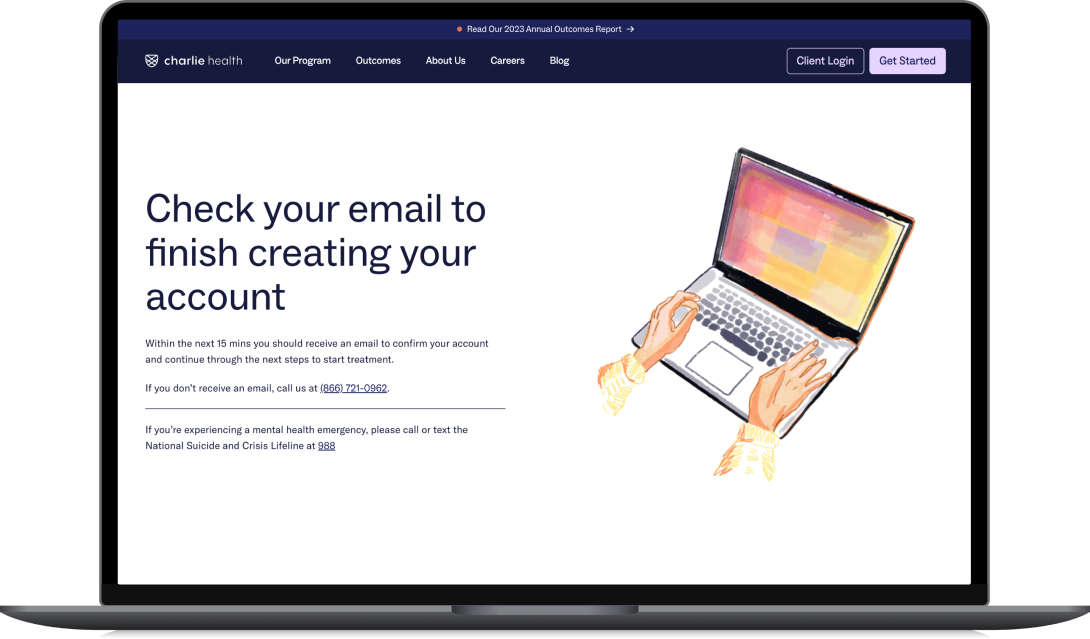
 Reach out
Reach out
Call our Admissions Team 24/7 or fill out our quick form to learn more about our program and verify your insurance coverage
Get Started
 Get matched
Get matched
We’ll conduct a thorough assessment to create your personalized virtual treatment plan
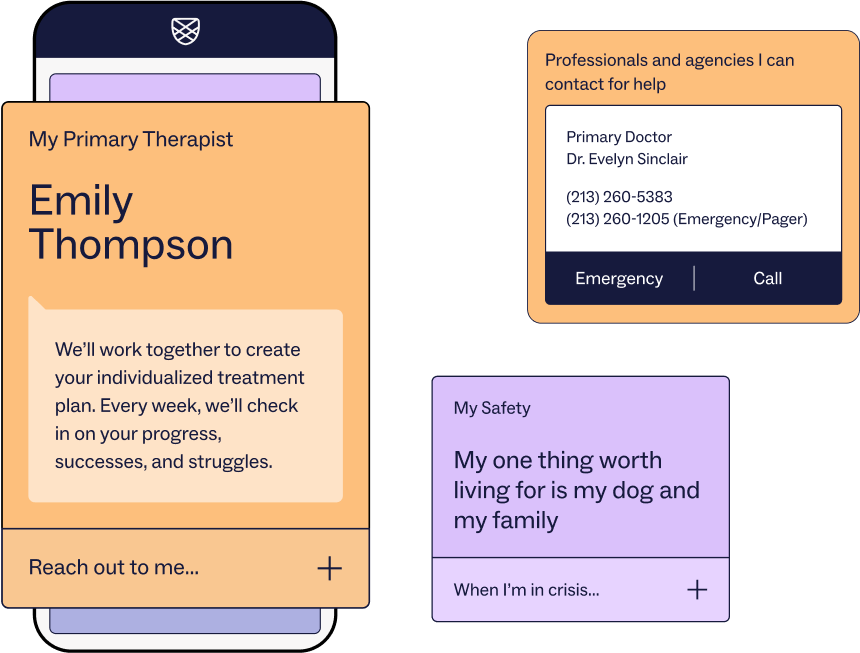

 Get matched
Get matched
We’ll conduct a thorough assessment to create your personalized virtual treatment plan
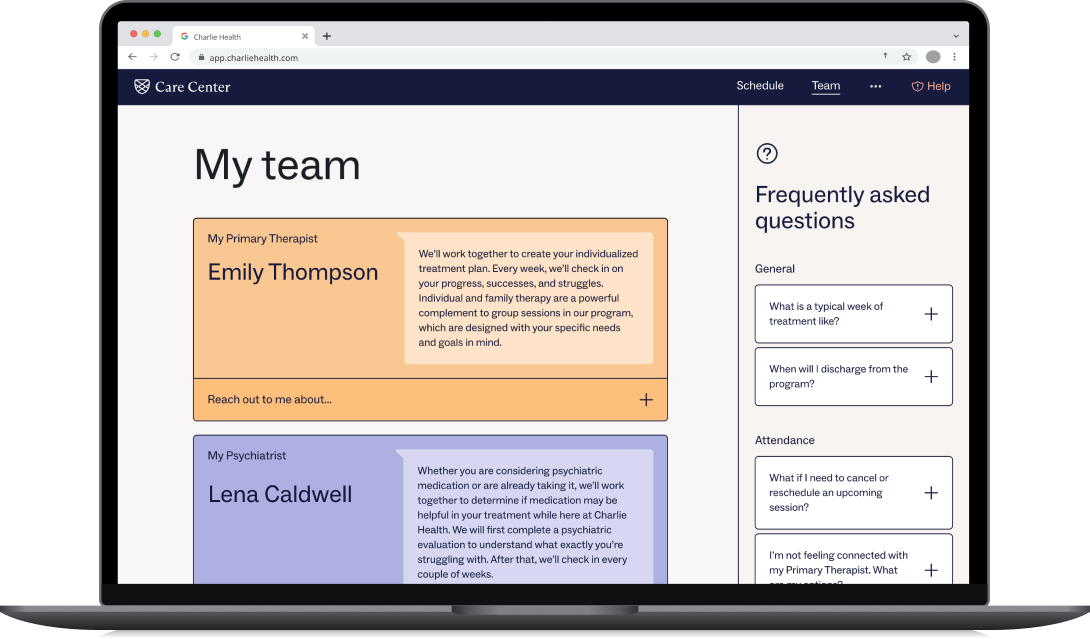
 Start healing
Start healing
Connect with peers in groups and meet your Primary Therapist in as little as 24 hours
We proudly partner with many major insurance providers, including commercial, Medicaid, and TRICARE
The core mental health conditions we treat
FAQs about Charlie Health’s virtual Intensive Outpatient Programs (IOPs)
See All FAQsWhat is virtual IOP?
Virtual Intensive Outpatient Programming (IOP) is a level of mental healthcare that is typically more structured and intensive than traditional once-weekly therapy. Treatment is delivered to clients directly at home.
There are two main reasons someone may enroll in an IOP:
- A recent discharge from a residential treatment program (behavioral health or substance use), partial hospitalization program, or an emergency department.
- If they are already attending weekly therapy but are continuing to struggle with their mental health.
Virtual Intensive Outpatient Programming (IOP) is a level of behavioral healthcare that offers more structure and support than traditional once-weekly therapy. All treatment takes place at home through secure video sessions.
People may enroll in a virtual IOP for several reasons, including:
- A recent discharge from a residential treatment program, partial hospitalization program, or an emergency department.
- Already attending weekly therapy, but still struggling
- Limited access to local complex behavioral health services
- Needing a covered option when nearby programs are not in network
Virtual IOP includes multiple group sessions, individual therapy, and family therapy per week. The goal is to help people manage their behavioral health and build lasting coping skills while receiving care from home and keeping their routines intact.
How does virtual IOP work at Charlie Health?
Our virtual Intensive Outpatient Programs (IOPs) provide personalized treatment for kids, teens, and adults with serious behavioral health needs. Each program runs for 9–12 weeks and includes up to 9–12 hours per week of:
- Group sessions
- Individual therapy
- Family therapy
- Psychiatry, as needed
In addition to our core treatment model, every client has access to our 360° care ecosystem. These services are designed to remove barriers to care, strengthen safety and continuity, and help clients stay engaged both during treatment and after discharge. The ecosystem includes 24/7 crisis support, Care Coaches, family and community support groups, care navigation, individualized discharge planning, and our Alumni Program.
We design each treatment plan with one primary goal in mind: helping clients heal and rediscover hope. If you think you or a loved one could benefit from Charlie Health, please contact our Admissions Team to get started in as little as 24 hours.
How do I know if Charlie Health’s virtual IOP is right for me or my loved one?
Our virtual IOPs are a good fit for kids, teens, or adults who need more support than once-weekly therapy can provide. Many clients have recently been discharged from a higher level of care (such as residential treatment, inpatient care, or an emergency department visit), while others are still struggling despite regular outpatient therapy.
Unlike traditional outpatient treatment, which typically involves a single weekly session, our virtual IOPs include multiple hours of care each week. Every client receives a personalized treatment plan that includes three group sessions per week, plus weekly individual and family therapy, and psychiatric services as needed.
Different therapeutic modalities are used throughout treatment, including CBT, DBT skills, ACT, and CFT, so clients receive comprehensive, evidence-based care that fits their needs.
How long are the programs?
Our program typically lasts 9-12 weeks; your exact discharge date depends on your overall treatment progress. Your Primary Therapist helps determine the best discharge date for your needs. View a sample schedule and learn more about how it works here.
To get started with your personalized treatment plan, reach out today.
Will insurance cover virtual IOPs at Charlie Health?
We accept most major insurance providers and Medicaid (in states where IOP is covered). Please contact our Admissions Team to learn more about your plan’s specific coverage, or check out our insurance page.
